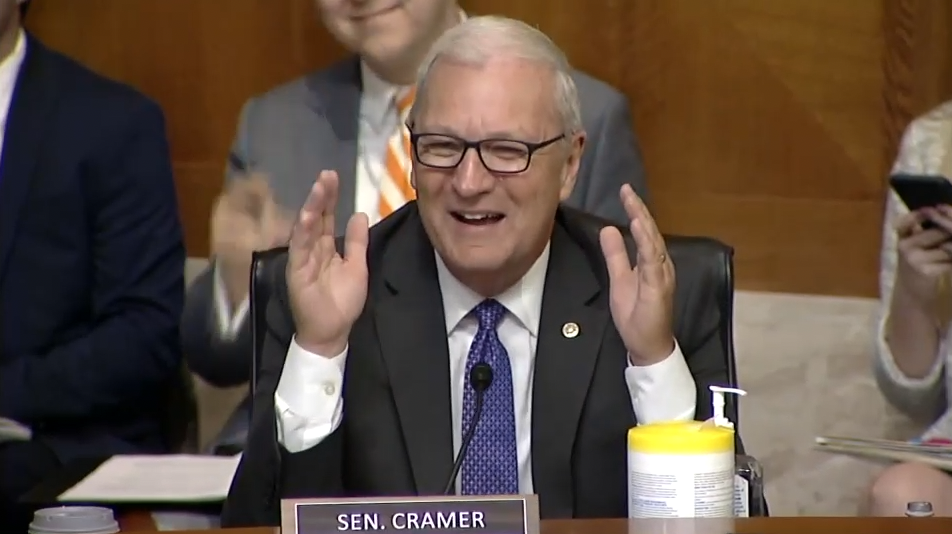Source: United States Senator Kevin Cramer (R-ND)
***Click here to download video. Click here for audio.***
WASHINGTON – U.S. Senator Kevin Cramer (R-ND), Ranking Member of the Transportation and Infrastructure Subcommittee, questioned Shailen Bhatt, nominee to be Administrator of the Federal Highway Administration (FWHA) at a Senate Environment and Public Works (EPW) Committee hearing today. Senator Cramer pressed Bhatt to rein in the bureaucracy and focus on implementing the Bipartisan Infrastructure Law as Congress intended it.
Senator Cramer discussed the FWHA’s Greenhouse Gas (GHG) Emissions Performance Measure Notice of Proposed Rulemaking, which imposes GHG performance measures on state departments of transportation and metropolitan planning organizations without any new authority from Congress. He said “it directly contradicts” the Bipartisan Infrastructure Law. He also emphasized the different needs of rural states, like North Dakota, while highlighting the importance of these considerations and state flexibility when developing regulations.
“I come from a rural state, North Dakota. We have a lot more miles of highway than we have people. But we take very seriously that we grow a lot of food commodities to feed a hungry world. That big world that’s hungry is far from North Dakota. We [produce] a lot of energy for a growing national economy and global economy. We used to do a lot more of it, but we’d like to do it again. So this vast system of highways that we manage is very important, and it’s very, very rural. The regulations that come out of the Federal Highway Administration need to reflect that. Not every place is New York. Not every place has a coast, but the coast has fierce advocates and the mountains have fierce advocates and so do prairies of the Midwest. Everybody’s just a little bit different and I think that rules have to reflect that. But in the proposed greenhouse gas emissions [performance measure] rule, one of the things indicates is the [Department of Transportation] can replace cars and trucks with a transit system. Well, we don’t have the type of population density in North Dakota that that’s even plausible or possible, much less, should be part of any rule. Getting back to flexibility, it is really, really critical,” said Senator Cramer.
Senator Cramer then pivoted to needed permitting and efficiency reform, especially when it comes to unelected agency bureaucrats.
“I want to highlight that we reached a consensus in this country and we agreed that there’s a need to streamline regulatory review. The [One Federal Decision] that we’ve talked about already was part of [the Bipartisan Infrastructure Law]. We codified that in the [law]. Now we discussed other things that didn’t become part of the bill. One of my frustrations as we’re having a debate in the Senate right now over permitting reform, is that when we come up with permitting reforms and we try to legislate them, what I’ve noticed is that unless we tell the bureaucracy exactly what they are required to do, and furthermore, tell them exactly what they’re prohibited from doing, they’ll do whatever they want to do. So please help me be reassured that you’re going to advocate for states and for states’ rights,” asked Senator Cramer.
In response, Mr. Bhatt committed to working with states and localities for solutions as opposed to imposing one-size-fits-all mandates.
“All I can say is I understand. In Colorado, as an example, the transportation solutions that made sense in the Denver metro area, were not what we were discussing out in the eastern plains or in other more rural parts of the state. My commitment is that I think the best solutions are the ones that are brought forth from the states and make sense in that it’s not a one-size-fits-all. It’s what that local decision [to] make. On the permitting side, I think it is just so critical from a safety perspective, from a cost effectiveness [perspective] that we get these projects delivered on time and on budget, that would be my commitment,” responded Mr. Bhatt.
Senator Cramer concluded by encouraging Mr. Bhatt to advocate for innovation and permitting reforms if confirmed.
“By the way, the fact that Senator Hickenlooper vouches for you is good, but the fact that former Governor Hickenlooper vouches for you is even better. Like all these former governors in the Senate, we have lots of them. They bring a level of common sense that’s not as common as it ought to be,” said Senator Cramer. “Senator Hickenlooper is quoted in the Denver Post that you’re a fierce advocate for innovation is hopeful. Because I do believe that there are innovations that can allow us to do more, quicker, efficiently without compromising the integrity of our care for the environment and the tax dollar.”
Background:
In February, Senator Cramer led his colleagues in two letters to the U.S. Department of Transportation pressing the Biden Administration to implement the Infrastructure Investment and Jobs Act (IIJA) according to the law and highlighting concerns with the FHWA-issued guidance. The IIJA also explicitly excluded language to limit states from expanding their infrastructure beyond the maintenance of existing roads and highways and codified expedited permitting reforms for highway projects. During bill negotiations, Senator Cramer secured the traditional split of Highway Trust Fund program dollars of 90 percent formula funding to 10 percent discretionary grants, ensuring states have consistent funding and the flexibility to meet their constituents’ needs.
At an EPW hearing in March, Senator Cramer pressed Transportation Secretary Pete Buttigieg to rescind their flawed guidance regarding the implementation of the Bipartisan Infrastructure Law.
When the FWHA’s proposed rule to impose greenhouse gas emissions performance measures on state departments of transportation and metropolitan planning organizations was released in July 2022, Senator Cramer issued the following statement:
“The Biden Administration’s Federal Highway Administration is veering off course once again. First, they issued guidance aiming to upend the funding flexibility given to states and now they want to saddle state transportation departments with emission reduction requirements. This proposed rule needs to be fully rescinded.”
